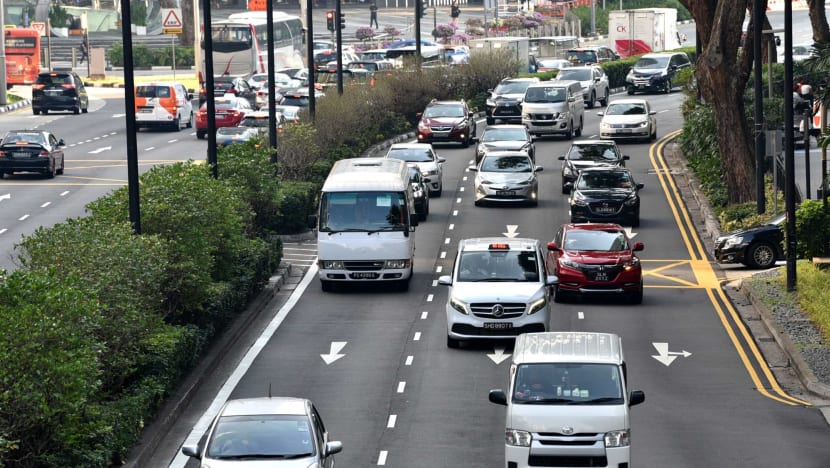Government Parliamentary Committee for transport monitoring rising COE prices, impact on transport cost for Singaporeans
Certificate of Entitlement (COE) premiums have remained high, with the latest bidding exercise on Apr 5 closing with Category A and B prices breaking records for the second time in a row.

Cars and other vehicles in Singapore. (File photo: CNA/Jeremy Long)
SINGAPORE: The Government Parliamentary Committee that oversees transport is monitoring the rising Certificate of Entitlement (COE) prices and its impact on cost of transport to Singaporeans, its chairman Saktiandi Supaat told CNA.
Mr Saktiandi (PAP-Bishan-Toa Payoh) was addressing the high COE premiums following the latest bidding exercise on Apr 5, which closed with Category A and B prices breaking records for the second time in a row.
For Category A cars, or those 1,600cc and below with horsepower not exceeding 130bhp, premiums closed at S$96,501 (US$72,300), up from the previous high of S$93,503 in the last exercise. Premiums for larger and more powerful cars in Category B also rose to a new high of S$118,501 from the previous milestone of S$116,201 on Mar 22.
Government Parliamentary Committees are set up by the People's Action Party to "scrutinise the legislation and programmes of the various ministries", according to the Party's website. They also serve as an additional channel of feedback on government policies.
"There have been recent changes made to the price discovery structure, such as rolling average, but the effects may take time," said Mr Saktiandi, referring to the latest adjusted method for computing COE quota available for bidding.
Under this method of computation that took effect from Feb 1, the number of COEs available for bidding in each quarter will be the rolling average of the number of vehicles deregistered over the previous four quarters, instead of two.
This is meant to further reduce the quarter-on-quarter volatility of COE supply.
"We are cognizant that demand remains high, but the cycle may turn in the second half of 2023 or end of 2023 as highlighted by several market participants," added Mr Saktiandi, who is an economist by training.
"It may be useful to continue to monitor if the COE prices start to fall in the second half of 2023 as the number of deregistered vehicles is expected to pick up towards the end of 2023."
CURBING COE PRICES
The rise in COE prices is a reflection of the "continuing demand for cars" alongside the "zero vehicle growth policy" that "obviously curtails supply of COEs", said Mr Saktiandi.
"Short of moving away from the zero growth policy, which is unlikely, the demand for cars will be affected by rising rates, economic cycles and also general sentiment as well as seasonal patterns of the past registration peaks and troughs."
The "smoothening method" for the deregistered vehicles has "helped somewhat", added Mr Saktiandi. But the committee may need to monitor if the COE prices reach levels that may be "less than optimal" due to "non-real supply and demand factors driven by market inefficiencies leading to price distortions".
Mr Gan Thiam Poh (PAP-Ang Mo Kio), who also sits on the transport Government Parliamentary Committee, added that it is "too early to judge" how measures like the adjustments to the additional registration fee system affecting luxury cars will "filter down".
He, too, noted the cap on vehicle growth - but said that "demand is always there" despite limited supply. This could also be due to "aspirations of Singaporeans" to own a car, he suggested.
"I also notice with more completion of MRT lines, more people are riding the MRT. We can see more people going for public transport. But that doesn’t mean people don’t wish to own cars," he said.
Highlighting possible ways to address rising COE prices, Mr Gan pointed to existing measures, like car-sharing schemes, as well as increasing public transport and private-hire service choices and making them "more convenient" and "more economical".
On the other hand, Mr Saktiandi added: "The best approach is to address any specific market microstructure or market failures, such as the efforts being made for the motorcycle COEs on the duration reductions."
He was referring to the Land Transport Authority's move in March to cut the validity period of temporary motorcycle COEs from six months to three.
"One other extreme option eventually may be to lead to restrictions on the number of cars purchased per household to ensure equality in terms of access to vehicles for personal consumption. But that may not be viable at this juncture," he said.

















